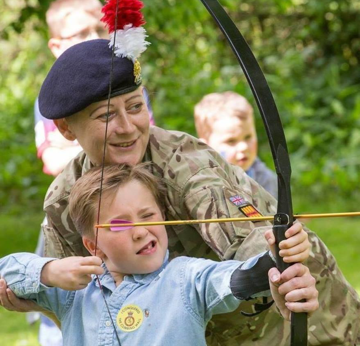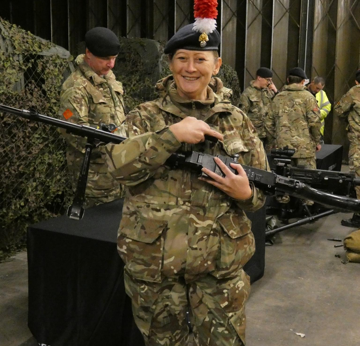Vickis story: Volunteering to Training
Victoria Gardner, our Health and Social Care Trainer, is also an Army Cadet Force Volunteer.
Victoria Gardner, our Health and Social Care Trainer, is also an Army Cadet Force Volunteer. As part of our commitment to the Armed Forces Family through signing the Armed Forces Covenant, we have asked Vicky to write a blog on how the skills she has gained through volunteering transfer over into her role as a trainer in the business.
How did it start?
How does my volunteering role impact on my work role? Excellent question, well posed, but without an easy answer! I started many moons ago as an Army Cadet, looking for fun, challenges, and adventures. I certainly got a lot more than I bargained for – a lifelong passion for supporting our young people to develop their skills and become useful members of society! Being a member of Northumbria Army Cadet Force has offered me some of the most rewarding and random experiences of my life, from attending Buckingham Palace, testing Portable Field Showers for the Royal Engineers, to playing the part of our founder Octavia Hill during our 150th Anniversary! It’s been 20+ years of being tested to the limit personally, but also guiding and supporting a varying mix of young people, from cadets who come from severely disadvantaged backgrounds to those who have complex medical and behavioural needs, the skills I have gained cannot be quantified by exams and certificates.

Volunteers within the Army Cadet Force (ACF) are also varied, I work with and manage veterans, healthcare professionals, teachers, police officers, social workers, office workers, mechanics, delivery drivers and stay at home parents, (to mention just a few occupations) and the combined experience and knowledge they bring to the table is invaluable. Like most occupations, skills can be taught, but having fundamental core values are what we seek, to provide guidance to our youth. If I can guide and support just one person along the right path, then the positive affect that will have on the local community is priceless.
‘How do you know how to do that?’ is a question I have been asked on numerous occasions. I have gained numerous transferable skills through my voluntary role. I give thanks to the Ministry of Defence, Reserve Forces and Cadet Forces Association and Senior Officers, who have offered me various opportunities to attend courses that interested me. I am a qualified shooting coach for example, but there cannot be much call for you doing that at work, I hear you say. Most definitely not! However, there are many transferable skills that I can use in my day job. From planning, attention to detail, public speaking, conflict resolution, the skills I have gained from my volunteering have played a huge part in how my career has developed over the years.

Completing a Level 3 Award in Education and Training through the Ministry of Defence has led to me changing direction within my care career. I have been instructing throughout my time with ACF, qualified by completing Military Instructional Courses but had never had a civilian teaching qualification. Within my role, I deliver First Aid Training, over the years anyone could teach First Aid who had completed the relevant instructor’s course and then the world changed again. Compliance, IQA, CPD and other lovely acronyms were being bandied about. To ensure the quality of our training, instructors were required to have a civilian teaching qualification. However, what about all the years of quality instruction delivered without a certificate? How were we to get instructors with a teaching qualification, when we were all volunteers, working in our ‘real life’ jobs as well as volunteering – where were we to find the time to become qualified?
Fortunately, the Level 3 Award in Education and Training was looked at and reflective experience, learning and delivery were applied. The information was sent out – Anyone who wished to remain qualified to deliver First Aid, had to hold a relevant teaching qualification and those of us dinosaurs who had been around forever, packed our bags and headed off for a week at our spiritual home in Surrey, known as Frimley Park. A full-on week of all things First Aid, as well as delivering teach backs, having performances videoed, and evaluated by our peers and tutors followed. An intense time but completely worth the stress and headaches when we all completed and achieved our award.
It was just the beginning however, as I continued in my then civilian role, in care as a manager, I continued developing my voluntary role. Delivering First Aid courses to young people aged between 12-18 years and ensuring all the adult volunteers hold First Aid Qualifications. Alongside, developing my interest in Mental Health First Aid and delivering our Healthy Minds Course across Northumbria ACF.
Wellbeing
Many managers I have worked with in the past have been driven by results and had little understanding of wellbeing. One thing that I have linked between my young people and the people we look after in my care role, is the effect of good nutrition, hydration and exercise, on over all well being and physical health. This can also be applied to our work force and our volunteers too. If we can maintain this golden triangle, we can have a positive affect on attitudes and behaviours, but also this can support those with physical conditions to achieve better all-round health.
By having managers who understand what well-being is and how to support their customers and staff, we can reduce the amount of customers who require hospital interventions and hospital stays and also the amount of staff sickness related to poor wellbeing.
We sometimes pay lip service to wellbeing, however the proof is in the pudding, as they say. Customers and staff who are well looked after and whose wellbeing is prioritised contribute to the smooth running of the business.

How to find the right care for you or your relative
1. Find your local office
Bluebird Care delivers care from locally based offices, find yours to start your care journey today.
2. Get in touch with us
Fill in our call back form or give us a call to find out how we can help you.
3. Assessment
We’ll come out to you to find out what you or your loved one needs to help stay independent at home.
4. Care team chosen & care starts
You'll be cared for by our specially trained team to support you to remain at home for as long as possible.

